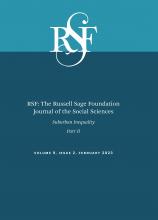Abstract
High-profile police killings in the United States have drawn attention to how municipalities generate revenue through citations and arrests. This article investigates whether killings by police are more frequent in places that rely on fine-and-fee revenue by first describing the types of municipalities that collect the most money from monetary sanctions. It then analyzes whether fine-and-fee reliance and a municipality’s status as urban, suburban, or rural are associated with police killings. Descriptive statistics and negative binomial models reveal that suburbs with large Black populations rely the most on fine-and-fee revenue and police killings are higher in central cities than suburbs or rural towns. Cross-sectional and longitudinal regression models find that municipalities that rely more on fines and fees have more police killings, suggesting municipal fiscal imperatives influence police violence.
- © 2023 Russell Sage Foundation. Beck, Brenden. 2023. “Police Killings and Municipal Reliance on Fine-and-Fee Revenue.” RSF: The Russell Sage Foundation Journal of the Social Sciences 9(2): 161–81. DOI: 10.7758/RSF.2023.9.2.07. The author thanks Eaven Holder and Makayla Ogdahl for research assistance. For their invaluable feedback on earlier drafts, he also thanks Angela LaScala-Gruenewald, the participants of the Russell Sage Foundation’s conference on suburban inequality, the editors of this special issue, and the four anonymous reviewers. Direct correspondence to: Brenden Beck, at Brenden.Beck{at}ucdenver.edu, University of Colorado Denver, Department of Sociology, Campus Box 105, PO Box 173364, Denver, CO 80217, United States.
Open Access Policy: RSF: The Russell Sage Foundation Journal of the Social Sciences is an open access journal. This article is published under a Creative Commons Attribution-NonCommercial-NoDerivs 3.0 Unported License.






